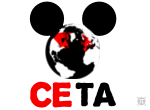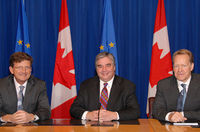CETA Analysis from others organisations : Différence entre versions
(→Society, economy, environment, access to public markets (water, electricity, etc.)) |
(→CETA: what is it?) |
||
| Ligne 7 : | Ligne 7 : | ||
[[File:Ceta_150px.png|thumb]] | [[File:Ceta_150px.png|thumb]] | ||
| − | CETA ( | + | CETA (Comprehensive Economic and Trade Agreement between Canada and Europe) is a wide trade agreement negotiated since 2009 by Canada and the European Union. Currently being finalised, it could be signed before the end of 2012. Only a few days after the rejection by the European Parliament of ACTA, leaks of the CETA's chapter dedicated to the protection of intellectual property were published, which echoes word for word the worst parts of ACTA. Also, most analysts are seeing in CETA a rewriting of OMPI or APIC (OMC) treaties. |
Once again, this time through CETA, the EU Commission is trying to bypass the democratic process in order to impose repressive measures, already rejected by citizens and the European Parliament. Like ACTA, CETA is a major threat to freedom of expression online and creates legal uncertainty for Internet actors. | Once again, this time through CETA, the EU Commission is trying to bypass the democratic process in order to impose repressive measures, already rejected by citizens and the European Parliament. Like ACTA, CETA is a major threat to freedom of expression online and creates legal uncertainty for Internet actors. | ||
Version du 1 octobre 2012 à 14:20
Sommaire
CETA: what is it?
CETA (Comprehensive Economic and Trade Agreement between Canada and Europe) is a wide trade agreement negotiated since 2009 by Canada and the European Union. Currently being finalised, it could be signed before the end of 2012. Only a few days after the rejection by the European Parliament of ACTA, leaks of the CETA's chapter dedicated to the protection of intellectual property were published, which echoes word for word the worst parts of ACTA. Also, most analysts are seeing in CETA a rewriting of OMPI or APIC (OMC) treaties.
Once again, this time through CETA, the EU Commission is trying to bypass the democratic process in order to impose repressive measures, already rejected by citizens and the European Parliament. Like ACTA, CETA is a major threat to freedom of expression online and creates legal uncertainty for Internet actors.
The negotiators
Canada:
- Steve Verheul, Canada's chief trade negotiator
- Ana Renart, Deputy Chief Trade Negotiator
EU:
- Mauro Petriccione, DG TRADE European Commission, chief negotiator (in the left, with Van Loan (Minister of International Trade) and Steve Verheul (Canada's chief trade negotiator).
- Maurizio Cellini, Head, Economic and Commercial Affairs, Delegation of the european Union to Canada
Negotiators would have been divided into 21 groups, and included 35-40 people for the European Union, and 60 people for Canada.
The rapporteur
 Peter ŠŤASTNÝ MEP EPP
Peter ŠŤASTNÝ MEP EPP
Documents
- February 2012 leaks of chapter dedicated to the protection of intellectual property
- Comparison ACTA-CETA
- January 2011 leaks
- January 2010 leaks
- Steve Verheul's question and answer session, on the state of the negociations, at the House of Communs, Tuesday, June 19, 2012
LQDN's press release
Analysis from others organisations
In the area of the human rights and freedoms
Michel Geist
- The Inclusion of ACTA Within CETA: Why The Concern Is Warranted
- Billions at Stake if Canada Caves on Drug Patent Demands
- CETA Update, Part Two: ACTA Provisions Are Still Very Much Alive
- CETA Update, Part One: Political Decision on Pharma Patents in the Fall
- Why the European Commission's Assurances on ACTA & CETA Don't Add Up
- EC Says ACTA ISP Provisions Dropped from CETA, Yet Most of ACTA Likely Remains Intact
- The Inclusion of ACTA Within CETA: Why The Concern Is Warranted
- ACTA Lives: How the EU & Canada Are Using CETA as Backdoor Mechanism To Revive ACTA
- Canada – European Trade Deal At Risk Due To Controversial Copyright Rules
EDRI
Jeremy De Beer
In others area
Society, economy, environment, access to public markets (water, electricity, etc.)
Canadian Union of Postal Workers (CUPW)
Against economic liberalization of postal services of Canada Post
The Council of Canadians, chaired by Maude Barlow
Against economic liberalization, highlight threats to Canadian communities and the environment
Trade justice Network
About: The Trade Justice Network is comprised of environmental, civil society, student, Indigenous, cultural, farming, labour and social justice organizations that have come together to challenge the scope and secret negotiating process of the Canada-European Union free trade negotiations (CETA), and to highlight the need for a more sustainable, equitable and socially just international trade regime.
Comic: Top ten reasons why CETA is bad for Canada
Québec Network on Continental Integration (RQIC)
Group of associations, including ATTAC-Québec for example
The Réseau québécois sur l'intégration continentale (RQIC) is a coalition of research teams and of grass-roots, union, community, environmental, and international-cooperation organizations. Its objective is to propose a vision of development for the Americas in a framework of respect for social, labour, and human rights and to promote democracy, involvement, respect for the environment, and the eradication of poverty throughout the hemisphere.
Highlight the economic, social, environmental and political effects of CETA on Quebec
CUPE (Canadian Union of Public Employees)
VIDEO: Canada’s communities are not for sale!
Against oil sands
Canadian lobbying against EU climate policy must end, says joint letter ahead of trade talks
Potential Impacts of the Proposed CETA on the Pace and Character of Oil Sands Development (pdf)
Keep Europe Out Of The Tar Sands (pdf)
Rob Duffy:
What's Wrong With CETA? Plenty.
Terry Boehm, NFU President: CETA getting tougher on Citizens with each SECRET Draft
Access to drugs
Strong majority of Canadians oppose drug patent extension in Canada-EU trade deal: poll
Access to water
CUPE (Canadian Union of Public Employees)
CETA Watch: Toronto calls for protection from Canada-EU trade deal
Protection of provinces
Municipal opposition grows to Canada-EU trade pact
Legal opinion urges provinces to put brakes on secret CETA talks (with legal analysis)
Timeline
Future
- 15-26 october 2012: final round of negotiations at Brussels
Past
- 27th september 2012, 10:00: 3rd INTA monitoring group for Canada at European Parliament
- 17-21 september, 2012: 12th round of negotiations at Ottawa
- 17 september: Dutch governement confirms it will not approve any ACTA'smeasures, nor in CETA, nor in any other treaty.
- 24 august 2012: Answer given by De Guch at the Tarabella's question.
- 12 july 2012: EU Commission states that ACTA's chapters controversial are no longer part of CETA.
- 11 july 2012: MEP Marc Tarabella is tabling an Parliamentary questions on CETA for the EU Commission.
- 09 july 2012: Michel Geist, a Canadian law professor, shows on his weblog that a leaks of CETA dated february 2012 reproduces the worst chapters of ACTA.
- 04 july 2012: the European Parliament rejects ACTA
- march 2012: 11th round of negotiations at Brussels
- april 2012: 10th round of negotiations at Brussels
- october 2011: 9th round of negotiations at Ottawa
- july 2011: 8th round of negotiations at Brussels
- april 2011: 7th round of negotiations at Ottawa
- january 2011: 6th round of negotiations at Brussels
- october 2010: 5th round of negotiations at Ottawa
- july 2010: 4th round of negotiations at Brussels
- april 2010: 3rd round of negotiations at Ottawa
- january 2010: 2nd round of negotiations at Brussels
- october 2009: 1st round of negotiations at Ottawa
- may 2009: beginning of the negociations between Canada and the EU
- march 2009: Joint Report Canada-EU on establishing the scope of the Comprehensive Economic Agreement
- october 2008: Joint study Canada-EU dated, named Assessing the cost and benefits of a closer EU - Canada economic partnership




